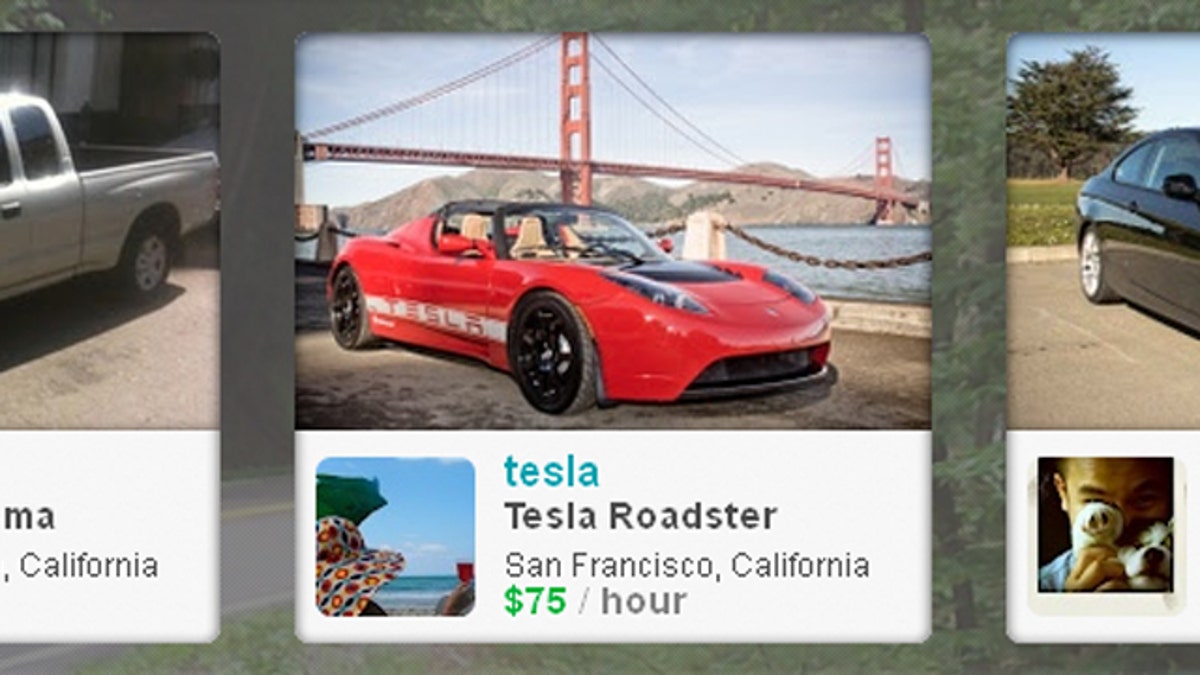
(GetAround)
For many years, renting a car has worked about the same way. You go online, type in your destination and choose from a limited selection of vehicles available from a specific agency.
Now, peer-to-peer car sharing services like RelayRides and Getaround promise to change the existing model – making it easier to rent a car right when you need one at low rates, and allowing car owners to make money off of their otherwise unused vehicles.
For now, RelayRides works only in Boston and in parts of San Francisco. Getaround is running a limited public beta test in San Francisco and in some areas of Silicon Valley, including Mountain View, Calif.
The types of rental cars available are much broader than what you will typically find through a traditional provider like Avis. In one survey in San Francisco, FoxNews.com found low-end commuter cars, large SUVs, full-size sedans and even a few more exotic models like a Tesla Roadster and a Porsche Boxster. Rates run about $5 per hour for an older commuter car up to around $75 per hour for a high-end sports car.
To rent a vehicle, you first need to sign-up for the service using a smartphone or online. Then you can look for nearby cars based on real-time GPS data. Say you want to rent a Porsche Boxster that you find just a block away from you. You can schedule the rental period, pay an hourly fee, and walk to the car.
A code unlocks the vehicle. With RelayRides, that means using an iPhone app that works with the OnStar service (but only if you are renting a GM vehicle). Getaround uses device that provides similar functionality. It plugs into the car’s power outlet and connects to the car’s internal systems. You can use an iPhone app to send an unlock code to the car and retrieve the keys inside. (Getaround does not explain the exact details about how the car kit works to deter fraud.)
The concept of peer-to-peer car sharing is also known as collaborative consumption. Services like AirBnB have shown there is a demand for peer-to-peer rentals. You can rent out your villa in San Francisco at a daily rate, or find a place to stay for a few days in Las Vegas at a much cheaper rate.
Thilo Koslowski, a Gartner analyst, says he likes the basic concept. “I see them impacting public transportation choices like busses, trains, and cabs. They could also delay the purchase of a new car.”
Both Getaround and RelayRides provide owners with a supplemental insurance policy that covers the car during the rental period, and both companies perform extensive background checks on renters. For example, Getaround runs about 10 checks for identity fraud related to the credit cards of renters.
Yet, as FoxNews.com learned, you might want to stick with Hertz, depending on your needs. One issue with the new services has to do with immediacy. In most cases, you need to wait at least an hour before you receive a response from the car owner. None of the people who rent the cars do so as a professional business. In some areas, you’ll find dozens of cars – in others, you might find only one or two.
Last month, an elaborate heist of several high-end cars rented through the HiGear (www.higear.com) service raised serious concerns over the peer-to-peer model. Some of the cars were eventually recovered, and the company has filed insurance claims, but HiGear is now out of business.
A spokesperson for Getaround says the cars rented through the service can be disabled if they are stolen. Shelby Clark, the founder of RelayRides, told FoxNews.com the OnStar service could be used to disable the engine of a stolen car. (GM did not immediately confirm whether this is possible.)
Koslowski says there are several other challenges to overcome. The peer-to-peer system is built on trust between the owner of the car and the renter. He says the business model for peer rentals is new and unproven, and that the market segment may be limited (e.g., mainly students).
Even though Getaround and RelayRides offer supplemental insurance, there is a question about liability: who is really culpable in a serious accident, or if an expensive car is totaled?
Rob Enderle, a consumer analyst with Enderle Group, says he doubts the peer-to-peer car sharing market will gain traction. The main problem, he says, is that the services will require extensive marketing to explain the concept and why the existing rental business isn’t working.
There also an issue of perception. Enderle says it would take just one or two incidents to destroy the reputation of either company, and that new market segments need to be more resilient than that. (A spokesperson for Getaround said there have only been a few minor accidents reported so far.)
Interestingly, one of the supposed benefits of peer-to-peer car sharing is that there will be fewer cars on the road and lower emissions. Koslowski says that is probably not true, however. The emission would be higher since cars that would be normally parked during the day would then be used. And, he says, the emissions from public transportation per person is lower than when one person rents a car.
That means peer-to-peer car rental companies have a tough road ahead. The experts agree that the idea has merit, and may prove to be a lucrative business model. But there is a question about whether these services can really compete against Hertz, Avis, and other established car rental companies.